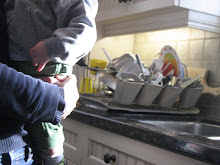So, while I was away, Stephen Harper, the prime minister of Canada, thought he'd appeal to women (he apparently doesn't poll well with us as a group), and to this end (or am I being too cynical?), he proposed an initiative to improve maternal and infant health in developing nations. His initiative, while laudable, has one gaping hole: it does not include funding or support for family planning; most specifically, of course, for abortion. As I said to my husband, imagine if we had no access to family planning--how many kids would we have??? (We have four, full stop). Blessedly fertile, without family planning--in our case, condoms and now a vasectomy--I would be pregnant non-stop, and not only would my own health suffer, but so would the health of our children.
Spacing out children and deciding how many one can reasonably care for is critical to both maternal and infant health: in fact, it's critical to the health of a family, and communities, and society generally. To survive and to thrive, infants and children need parents who have the resources to protect and nurture them. Not to mention that a woman who is constantly pregnant has the story of her life written for her: and the plot-line revolves around constant, repetitive, menial labour; and, often, early death.
Blue Milk is an awesome blog about mothering and feminism, and I discovered this piece on
abortion and motherhood. About pregnancy, she writes: "... this state of being is a devouring one, and ... it is vital that it not be experienced unwillingly by a woman."
That's the crux of the matter, for me. Carrying an unwanted pregnancy is like being trapped in the body. There is a tendency to judge women who accidentally become pregnant, but I've no interest in moralizing. Let us observe that some women carrying unwanted pregnancies are already mothers. Some have more children than they can care for. And some are willing to go to desperate measures to prevent their bodies from carrying another pregnancy to term. A recent
article by Geoffrey York in the Globe and Mail detailed the dangers and prevalence of abortion "clinics" in African countries where abortion is illegal. Guess what--it happens whether or not it is legally available. This shouldn't be news. Speaking as someone who has carried four children to term, it's entirely understandable. Had I not wanted to be carrying those children, the state of pregnancy would have been terrifying, overwhelming, devastating.
To imagine that you can craft a policy focused on maternal and infant health and leave out family planning, contraception, and, yes, as a last resort, abortion, is to imagine a world in which every pregnant woman is pregnant willingly. In other words, the policy could only be crafted in a fantastical vacuum; and though it might shock Mr. Harper to hear this, not all mothers idealize motherhood. In the messy and complicated human world in which we actually live, I, as a mother, accept that not all pregnant women are willingly pregnant. And, as a mother, having with love and excitement and gratitude borne my babies, I can imagine how desperate I would feel trapped in that other reality. Denying legal access to abortion does not deny access to abortion; it sends desperate women underground--including women who are already mothers.

